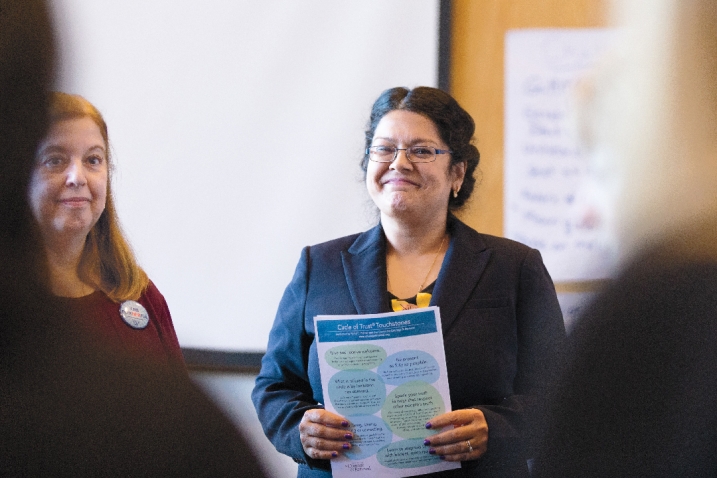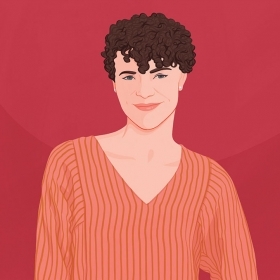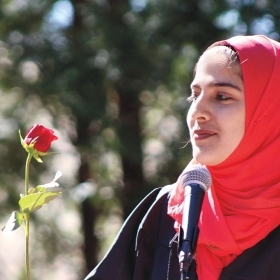Senior lecture emerita in psychology Linda Carli (left) and Preeta Banerjee taught the recent Women’s Leadership for Impact course at the College Club.
Photo by Stephanie S. Berenson
Is there a better place to learn about women’s leadership than Wellesley College? And that learning doesn’t necessarily start—or end—with the undergraduate experience. Just ask Nancy Coleman, associate provost and director of Strategic Growth Initiatives.
“Wellesley has a perspective on women’s leadership and women’s empowerment that transcends the four-year undergraduate experience,” Coleman says. Under her stewardship, Strategic Growth Initiatives has been extending the College’s reach through three main programs: pre-college and summer term, the Nehoiden Golf Club, and most recently, executive education. Last summer, the College launched its first workshop geared specifically toward professional women, Women’s Leadership for Impact, and this year, a slate of programs was planned, from additional leadership offerings to team-building and presentation-skills workshops.
While most programs are aimed at the midcareer professional, workshop attendees have diverse levels of experience and cover a wide range of industries. “The course topics and the way we’re approaching it, it hasn’t really mattered what you do or where you do it. They’re general concepts that, no matter if you’re in a nonprofit or deep in the STEM field,” says Pamela Landis, director of marketing and enrollment for Strategic Initiatives, “it’s conceptually the same.”
The executive education training market in the Boston area is a fairly crowded one, but Coleman and her team saw an opportunity to offer something unique—something Wellesley. “We had this perspective that women’s leadership was not about strategy. We didn’t want to approach it from a masculine perspective,” Coleman says. “We really wanted to integrate holistic learning, and that is not really being done out there.”
What sets apart Wellesley’s Executive Education for Women is its three-pronged approach to workshops. “It’s kind of this concept of head, heart, and hands. How do we stimulate people intellectually with some of the data and some of the lecture content. How can we help them practice some of it, that’s the hands piece, and then this mindfulness, this holistic ‘you need to take care of yourself’ is the heart piece,” Coleman says. “Those three components are really the approach we’ve taken throughout all of the programs.”
All three components are supported by Wellesley’s strengths: The campus offers a welcoming change from cookie-cutter hotel conference rooms, with opportunities for lake walks and mindfulness exercises. The College’s rich history of educating women and commitment to experiential learning provide a solid foundation for the programs. And the courses themselves are taught by a mix of business practitioners and Wellesley faculty. The leadership workshop was created and is co-led by Linda Carli, senior lecturer emerita in psychology and co-author of Through the Labyrinth: The Truth About How Women Become Leaders. “The material that we cover is based in large part on research on women’s leadership,” Carli says, “and that is a very distinctive feature of it, that it is empirical. It’s based on lots of research on what actually is effective, what are the obstacles for women leaders, [and] how can they overcome those obstacles.”
“These programs are really important for engaging women and having them expand the possibilities of what they can do,” Carli says. Just as Coleman and Strategic Initiatives look to expand the possibilities of what the College can offer beyond those four undergraduate years. “I think executive education, and even a pre-college summer term for teenage girls, are ideal opportunities to extend the power of Wellesley across a variety of different age groups,” Coleman says.
For more information, visit https://extended.wellesley.edu/professional.








We ask that those who engage in Wellesley magazine's online community act with honesty, integrity, and respect. (Remember the honor code, alums?) We reserve the right to remove comments by impersonators or comments that are not civil and relevant to the subject at hand. By posting here, you are permitting Wellesley magazine to edit and republish your comment in all media. Please remember that all posts are public.